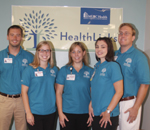|
by Anna
Tecklenburg and Crysta Schaff
HealthLinks
HealthLinks, a new MUSC program
that promotes family-centered
care, recently started its pilot
program in the Pediatric Primary
Care clinic.
The program
uses student volunteers to connect
MUSC patients and their families
to non-medical resources in the
community in order to improve
their overall health and
well-being. As South Carolina is
still feeling the effects of the
economic recession, many patients
and families that once had access
to basic services such as
transportation, working utilities,
child care programs, adult
education or food, are finding
that these services are harder to
locate and access.
Health
literature continues to
demonstrate the acute influence
that social factors have on the
biophysical health of an
individual. A person's location,
mobility and opportunity within a
given physical and social
environment can directly influence
that patient's ability to prevent,
manage and seek treatment for
potential health concerns. With
the help of student volunteers,
patients will have the opportunity
to better navigate services
offered in their local
communities.
 Supporting
HealthLinks are Layne Madden,
from left, Anna Baur, McRae
Hamer, Allyson Dodson and Daniel
Tagge. Program coordinators are
Anna Tecklenburg and Crysta
Schaff. Students interested in
volunteering may visit
www.muschealth.com/volunteer and
complete the HealthLinks
application. The program is
operated from 9 a.m. to 1 p.m.,
Monday through Wednesday, in the
Pediatrics Primary Care Clinic.
For information, call 792-3992
and leave a message or email
healthlinks@musc.edu. The
program ends Aug. 1 and will
resume Sept. 15. Supporting
HealthLinks are Layne Madden,
from left, Anna Baur, McRae
Hamer, Allyson Dodson and Daniel
Tagge. Program coordinators are
Anna Tecklenburg and Crysta
Schaff. Students interested in
volunteering may visit
www.muschealth.com/volunteer and
complete the HealthLinks
application. The program is
operated from 9 a.m. to 1 p.m.,
Monday through Wednesday, in the
Pediatrics Primary Care Clinic.
For information, call 792-3992
and leave a message or email
healthlinks@musc.edu. The
program ends Aug. 1 and will
resume Sept. 15.
Katy Kuder,
manager of Volunteer and Guest
Services supports the program.
"MUSC will truly be providing
holistic, family centered care
that offers continuity in health
care beyond the doctor's office."
McRae Hamer is
a College of Nursing student and a
HealthLinks volunteer. "Nursing
paradigm and theory stresses
treating individuals and families
with a multifaceted approach
rooted in the social, economic,
cultural and biological
determinants of health," she said.
"Achieving positive health care
outcomes requires more than simple
referrals to seek additional
services. Implementing a program
to assist patients with
identifying and navigating
community resources is a huge step
in the right direction."
By having an
avenue to research available
services, patients can leave their
doctor visit with a means to treat
the whole person – not just
biophysical health but the
economic, social and safety
factors that influence health.
Rhonda Lucas, nurse manager for
the Pediatric Primary Care Clinic,
said HealthLinks has been helpful
to the patients in the clinic. "We
are so appreciative of them
providing services to the
patients."
Not only will
the volunteers give referrals for
resources, they will also conduct
follow-up phone calls to ensure
that the patients are able to
connect with the resources
provided. Deborah Williamson, DHA,
associate professor and associate
dean for practice at the College
of Nursing said HealthLinks is a
great opportunity for students to
learn about the non-medical needs
that contribute to health
disparities and the available
community resources to meet these
needs. "As health professionals we
give advice and prescriptions for
a medical condition, but we aren't
improving the health of the
individual until we address basic
needs such as food, housing and
low literacy."
HealthLinks is
being operated by a dynamic and
highly-motivated team of students
from the colleges of Medicine and
Nursing. From the College of
Medicine are Anna Baur, Layne
Madden, Ellen Maher and Daniel
Tagge; and from the College of
Nursing, Caroline Dawson, Allyson
Dodson, Hamer and Elsie Sabone.
Their efforts have been critical
to the launch of this program. In
the fall, HealthLinks will open
its applicant pool to include
graduate, undergraduate and law
students from local colleges and
universities.
MUSC President
Ray Greenberg, M.D., Ph.D.,
conceptualized the idea of having
the HealthLinks program operate
out of MUSC, and medical director
Patrick Cawley, M.D., has
continued to champion the mission
of HealthLinks and the efforts of
the program's developers and
volunteers.
|



 Supporting
HealthLinks are Layne Madden,
from left, Anna Baur, McRae
Hamer, Allyson Dodson and Daniel
Tagge. Program coordinators are
Anna Tecklenburg and Crysta
Schaff. Students interested in
volunteering may visit
Supporting
HealthLinks are Layne Madden,
from left, Anna Baur, McRae
Hamer, Allyson Dodson and Daniel
Tagge. Program coordinators are
Anna Tecklenburg and Crysta
Schaff. Students interested in
volunteering may visit